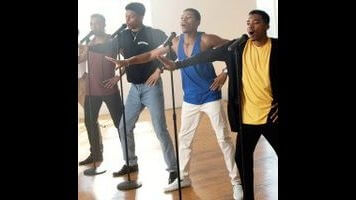If it isn’t love, then The New Edition Story is still pretty entertaining

BET’s The New Edition Story is a long-awaited revisiting of the Boston group’s legacy, though the “long-awaited” part may only strike a chord if you’re well versed in your R&B offshoots history. Time hasn’t been unkind to the group—Ricky Bell, Ronnie DeVoe, Michael Bivins, Bobby Brown, Ralph Tresvant, and Johnny Gill have all maintained a presence in the music industry—it’s just been somewhat indifferent. Or maybe it was just a case of bad timing. After all, these progenitors of new jack swing and modern-day boy bands were sandwiched between massively popular acts like The Jackson Five and New Kids On The Block. Luckily, this three-night miniseries aims to show viewers what they’ve been missing.
The two-hour opening act is an appropriately bright-colored production that fleshes out the group’s origins before moving into its early “Candy Girl” years. As children, the founding members of New Edition called Boston’s Roxbury project home; by the end of the first installment, they haven’t made it very far from its grounds, despite their hit records and tours. It’s an all-too-common tale, but the New Edition Story doesn’t lose any momentum in this jaunt through familiar territory. The young cast—Caleb McLaughlin, Myles Truitt, Dante Hoagland, Tyler Marcel Williams, and Jahi Di’Allo Winston—is cohesive from the outset, which is necessary in depicting a group famous for its precise choreography.
Even more impressively, these newcomers aren’t merely lip-syncing to some old tracks; they’ve recorded their own. “Candy Girl” and “Popcorn Love” sound as sweet as ever, which is what producer Jesse Collins and his Real Husbands Of Hollywood director Chris Robinson, both old school NE fans, were after when they sent the cast to “New Edition training camp.” The result is more loving homage than mere mimicry. These covers extend through the rest of the miniseries, which sees Empire’s Bryshere Y. Gray and The Wiz Live’s Elijah Kelley take on the roles of future BBD players Bivins and Bell for their adolescent-to-adult years. The opening scene drops us in the middle of the history lesson, during the “Home Again” tour, with Woody McClain approximating Bobby Brown’s “My Prerogative” swagger before being interrupted by Bell Biv DeVoe.
Gray was performing under the name Yazz before joining Empire, so he wastes no time settling into the role of Bivins, kicking off BBD’s “Poison” before everything goes to hell. But then the Story goes back to the beginning to show us just how deep the group’s ties ran before they ever entered a studio. Their motivations are also familiar, and include wooing girls and career ambitions. But when presented with the opportunity to break away from the group, a young Tresvant (Winston) sticks with New Edition. The scenes foreshadow several splits within the group in the 30-odd years since its formation, including a formal ousting of Brown when his ego became too much for the other members. He wasn’t the only one with solo aspirations, though, which is how Tresvant eventually topped the R&B charts, while BBD later introduced new jack swing’s pièce de résistance, “Poison.”
In addition to brotherhood and fizzy tunes, Abdul Williams’ script delves into the uglier side of the business. It’s a well-established fact that Brooke Payne (Wood Harris) was unprepared for the group’s success, and wasn’t quite savvy enough to keep up with all the wheeling and dealings of booking agents and recouping of expenses. But Harris’ portrayal is of a well-meaning, albeit not specially well connected man, just trying to do right by his clients, who include his nephew Ronnie DeVoe (Truitt). Both sides of the rift are sympathetic—the boys’ mothers just want to see some compensation for their years of touring and recording, but so does Payne.
The nuanced storytelling is the result of the miniseries’ many collaborators, including all six members of New Edition and Payne. Maurice Starr, who produced NE’s debut album, was absent behind the scenes but is portrayed by Faizon Love. His short-lived collaboration with the group inspired him to found New Kids On The Block, who kicked the new boy band movement into high gear. But even Starr isn’t painted the villain of this piece; the New Edition Story mines most of its conflict from the intraband dynamic, including substance abuse issues. It proves to be a rare retrospective, one that’s both unvarnished and hazily nostalgic, and is as good an entry point as any for those interested in an(other) East Coast fling.